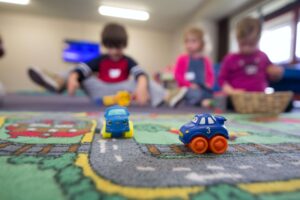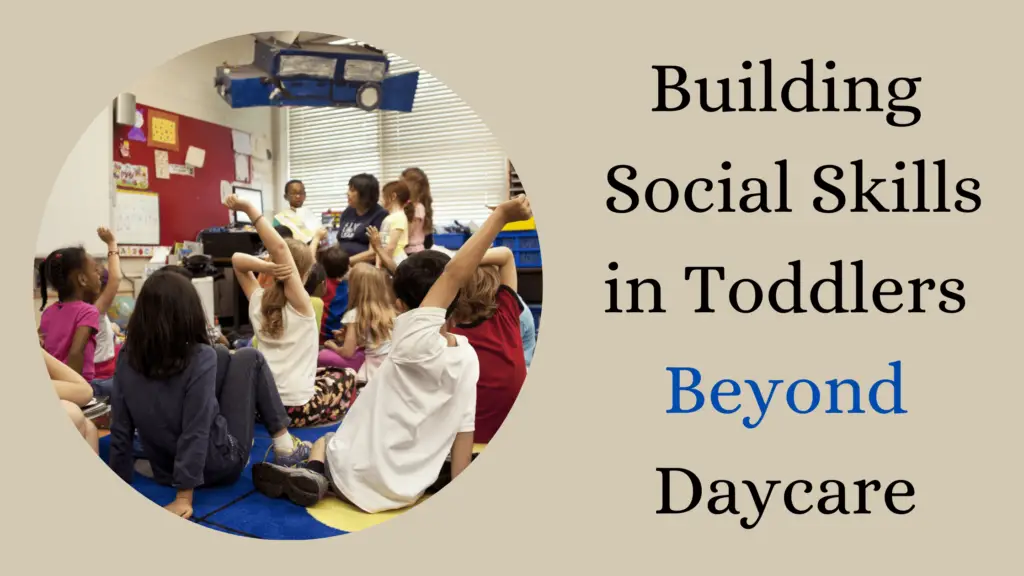Socialization is a critical aspect of a child’s early development. It involves learning how to interact with others, communicate effectively, and build crucial life skills. While many parents turn to daycare to provide socialization opportunities for their toddlers, there are various alternatives available for those who prefer to keep their children out of daycare. In this article, you will get to know how to socialize toddler without daycare.
Benefits of Socialization in Children
Cognitive, Emotional, and Social Benefits
Socialization during early childhood provides a plethora of advantages. It fosters cognitive growth by exposing children to different perspectives, problem-solving scenarios, and a wide range of experiences. Emotionally, socialization helps children understand and manage their feelings, teaching them empathy and emotional regulation. Socially, it forms the basis for building relationships, understanding social norms, and developing effective communication skills. These multifaceted benefits have a profound and lasting impact on a child’s overall growth and development.
Developing Communication Skills
Early socialization exposes toddlers to various forms of communication, including verbal and non-verbal cues. They learn to express themselves clearly, listen actively to others, and comprehend social cues. These skills are essential for their future success in both academic and social settings. Effective communication is a foundational skill that enables children to form healthy relationships and navigate complex social environments.
Building Self-Confidence
Interacting with peers and adults outside the family unit significantly contributes to a toddler’s self-esteem and self-confidence. By engaging in social activities and overcoming social challenges, children develop a sense of competence and autonomy. They learn to assert themselves, make choices, and build a positive self-identity. This early boost in self-confidence lays the groundwork for future social and personal growth.
Choosing Alternatives to Daycare
Many parents choose alternatives to daycare for various reasons. These reasons may include concerns about the quality of care provided in daycare facilities, the desire to have more control over their child’s early experiences, or financial considerations. Understanding your motivations for opting out of daycare will help you make informed decisions about alternative socialization methods.
Financial Considerations
Evaluate the financial aspects of daycare versus alternative socialization methods. While daycare can be costly, consider the expenses associated with alternative options such as classes, activities, and playgroups. Budgeting for socialization activities is an important aspect of planning for your child’s developmental needs.
Considering Your Child’s Unique Needs
Every child is unique, and their socialization needs may vary. Consider your child’s temperament, preferences, and any special considerations when choosing the right socialization path. Some children may thrive in structured environments like classes, while others may prefer unstructured playgroups or one-on-one playdates. Tailoring your approach to your child’s individuality ensures a more successful socialization experience.
Read About: What Does It Mean When a Toddler Rubs Your Stomach
How to Socialize Toddler Without Daycare
There are various ways you can socialize your toddler without daycare. The main ones are setting up regular playdates with other toddlers, encouraging them to participate in community programs, creating a structured routine with social opportunities and engaging in pretend play and role-modeling.
1. Playgroups and Playdates
Playgroups provide a structured and enjoyable way for toddlers to interact with their peers. These gatherings offer a supportive environment where children can engage in imaginative play, share toys, and learn valuable social skills. Being part of a playgroup introduces toddlers to a diverse range of personalities and encourages cooperation and teamwork.

Setting up regular playdates with other toddlers is one of the most effective ways to foster social skills. To initiate playdates, connect with other parents through local parenting groups, social media platforms, or by engaging in friendly conversations with other parents at the playground. Playdates offer a controlled and safe setting for children to practice social interactions and build friendships. They also provide opportunities for parents to share experiences and gain valuable support from one another.
2. Enroll in Classes and Activities
Many communities offer programs specifically designed for toddlers and their parents. These programs can include activities such as storytime at the library, music classes, gymnastics, and art classes. Participating in these programs exposes your child to new experiences and provides opportunities for socialization in a structured setting. These activities often incorporate group dynamics, fostering teamwork and cooperation.
Selecting the right classes and activities for your toddler involves considering their interests, developmental stage, and learning style. Some children may thrive in music classes where they can explore rhythm and creativity, while others may prefer more physically engaging activities like gymnastics. The key is to align your choices with your child’s preferences, ensuring they feel motivated and engaged in the socialization process. Additionally, these structured environments often provide opportunities for parents to connect and build relationships with other parents, further enhancing the socialization experience.
3. Creating a Structured Routine
Incorporating social opportunities into your toddler’s daily routine is an effective way to facilitate socialization. By scheduling activities like playdates, park visits, or library outings regularly, your child becomes accustomed to different social settings. A structured routine also helps your toddler anticipate and look forward to social interactions, reducing anxiety and resistance.
4. Pretend Play and Role-Modeling
Pretend play is a powerful tool for teaching social skills. During imaginative play, children create scenarios, take on different roles, and experiment with various social interactions. Engaging in pretend play with your child or encouraging them to engage in imaginative play with other children provides opportunities for practicing social skills, such as cooperation, negotiation, and problem-solving. Pretend play allows toddlers to explore social roles and dynamics in a safe and creative way.

Toddlers are keen observers, and they learn by watching the adults in their lives. Demonstrating respectful and positive social interactions in your daily life is a fundamental aspect of teaching your child how to navigate social situations. Model behaviors such as active listening, empathy, and conflict resolution. Your child is more likely to adopt these behaviors when they see them consistently demonstrated by trusted adults.
5. Sibling Interaction and Bonding
If you have other children, encourage them to interact and bond with your toddler. Sibling interactions offer unique opportunities for socialization within the safety of the family environment. Siblings can teach each other valuable lessons about sharing, cooperation, empathy, and conflict resolution. Encouraging positive sibling relationships fosters a strong foundation for social development.
Read About: Will My Toddler Remember Me Shouting
Being Mindful of Screen Time
Excessive screen time can hinder socialization efforts. It’s essential to set clear screen time limits and choose age-appropriate content to ensure your child’s social development isn’t compromised. While technology can offer educational and entertaining content, it should complement, rather than replace, face-to-face social interactions. Be mindful of the quality and quantity of screen time your child is exposed to and prioritize real-world social experiences.
Patience and Persistence
Socialization is a gradual process that requires time, effort, and patience. It’s important to embrace the challenges and celebrate the milestones along the way. Understand that socialization is not a one-time event but a continuous journey that unfolds as your child grows. Be persistent in your efforts and remember that each social interaction contributes to your child’s development.
Conclusion
Socializing your toddler without daycare is not only possible but also beneficial for their development. Now I believe you have conversed yourself with ways how to socialize toddler without daycare.
By implementing the strategies discussed in this comprehensive guide, you can provide your child with valuable social experiences that will shape their future success and well-being. Be patient, stay persistent, and enjoy the journey of watching your toddler grow into a confident and socially adept individual.







